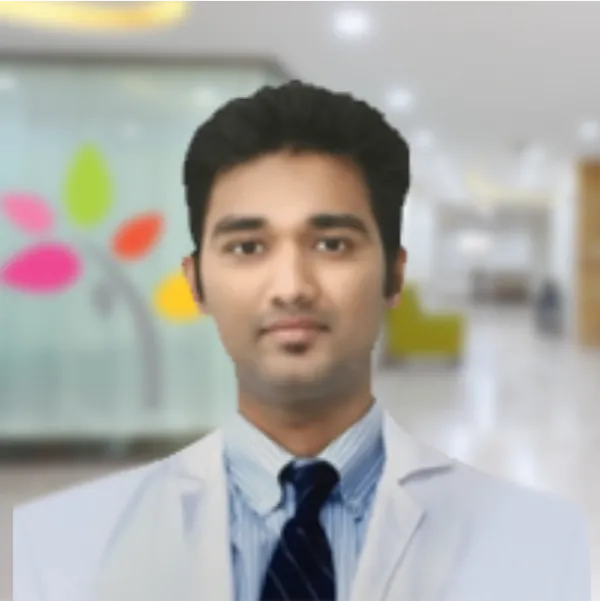Advanced Vascular Surgery for Effective Blood Vessel Repair
Get advanced vascular surgery with experienced specialists. Restore healthy blood flow, improve circulation, and enhance overall vascular function effectively.
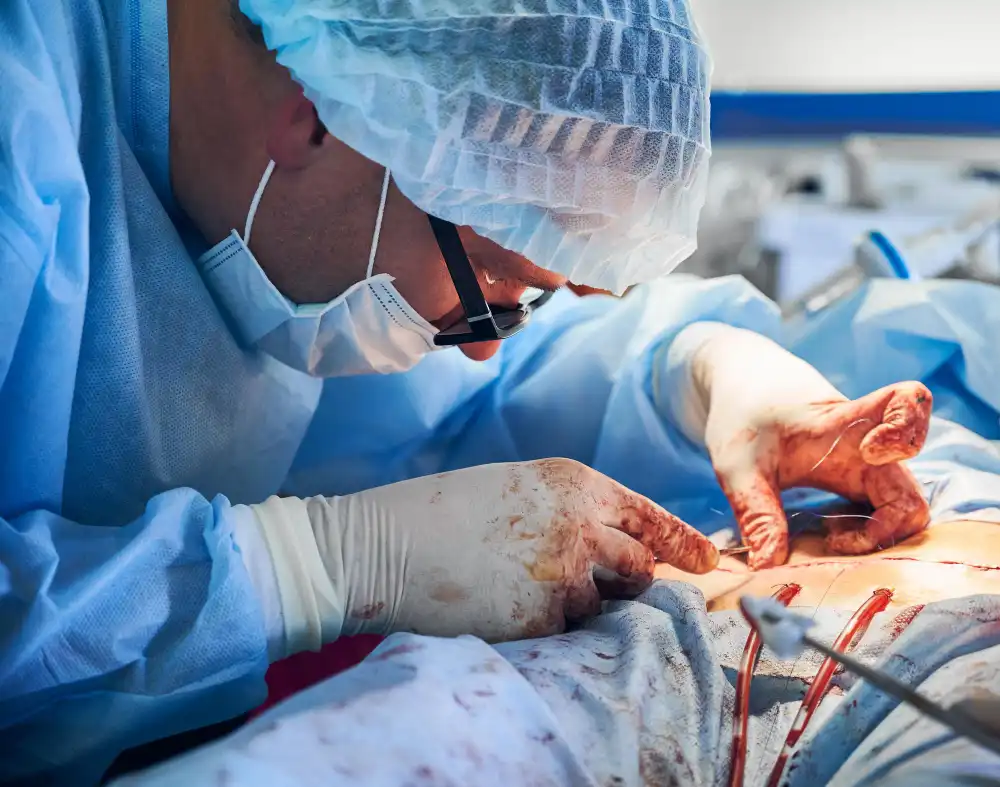
Vascular Surgery
Vascular Surgery is a specialized field of medicine focused on diagnosing and treating diseases that affect the blood vessels arteries, veins, and lymphatic circulation throughout the body (except the brain and heart). These vessels are responsible for carrying blood and oxygen to all tissues, and when they become blocked, narrowed, or damaged, it can lead to serious complications such as stroke, aneurysm, or limb loss.
At VS Hospitals, Chennai, the Department of Vascular Surgery provides advanced medical and surgical treatments for patients with vascular conditions. The hospital’s expert team of vascular surgeons, interventional radiologists, and cardiologists work collaboratively to deliver high-precision, minimally invasive care.
With world-class facilities, cutting-edge equipment, and patient-centered management, VS Hospitals ensures effective outcomes whether it’s restoring blood flow, repairing arteries, or managing complex vascular diseases.
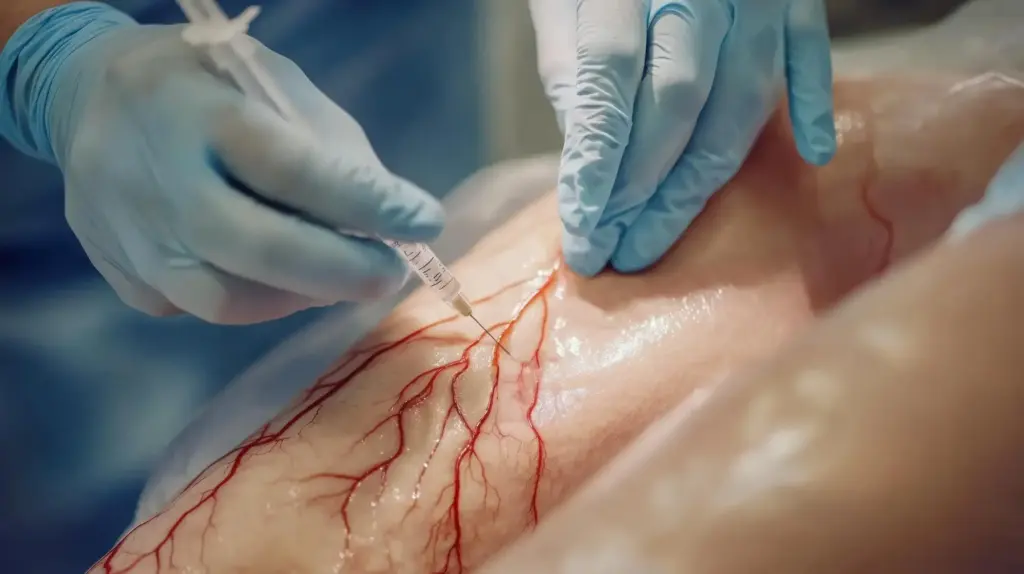
Early Detection Saves Lives
Early detection and treatment are crucial for improving the chances of survival. If you notice any concerning symptoms, consult a healthcare provider immediately.
Signs and Symptoms
Leg Pain or Cramps (Claudication)
Pain during walking or exercise that subsides with rest, indicating poor blood circulation.
Cold or Numb Extremities
Especially in the hands and feet due to restricted blood flow.
Swelling in Legs or Ankles
Often caused by venous insufficiency or varicose veins.
Non-Healing Wounds or Ulcers
Especially on the feet or legs, signaling peripheral artery disease (PAD).
Skin Discoloration
Pale, bluish, or reddish skin tones due to vascular insufficiency.
Visible Varicose Veins
Twisted, enlarged veins that may cause pain or heaviness.
Sudden Severe Abdominal or Back Pain
Could indicate an aortic aneurysm — a medical emergency.
Numbness or Weakness in Limbs
A potential sign of blood clots or arterial blockage.
Throbbing Mass in the Abdomen or Legs
May indicate an aneurysm or abnormal dilation of blood vessels.
Leg Fatigue or Weakness
Caused by reduced oxygen supply to muscles.
Blood in Urine
Hematuria - pink, red, or dark urine, the most common symptom
Frequent Urination
Feeling the need to urinate frequently, even when bladder is not full
Painful Urination
Experiencing pain or burning sensation while urinating
Back or Pelvic Pain
Pain that occurs as the cancer grows and spreads
Unexplained Weight Loss
Significant weight loss not related to diet or exercise
Fatigue
Feeling unusually tired or weak without a clear cause
Meet Our Expert Vascular Surgery Specialists
Risk Factors
Smoking
Smoking is one of the leading causes of bladder cancer. Chemicals in tobacco smoke can damage the lining of the bladder, increasing the risk.

Gender
Men are at a higher risk of developing bladder cancer than women.

Chronic Bladder Infections or Inflammation
Conditions such as bladder infections and long-term bladder inflammation can increase the risk.

Exposure to Chemicals
Prolonged exposure to certain chemicals, especially those used in the dye industry, rubber production, and chemical manufacturing, increases the risk.

Smoking
Damages blood vessel walls, leading to narrowing and blockages.

Diabetes
High blood sugar accelerates arterial damage and atherosclerosis.
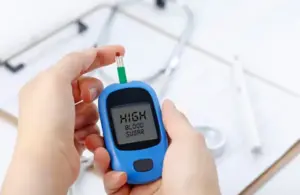
High Cholesterol
Causes plaque buildup, restricting blood flow in arteries.

High Blood Pressure
Strains arterial walls, increasing the risk of aneurysm or rupture.
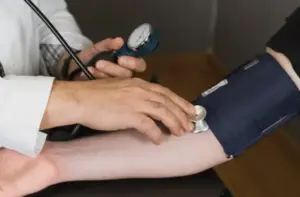
Obesity
Excess body weight adds pressure to veins, leading to varicose veins and thrombosis.

Sedentary Lifestyle
Lack of movement contributes to poor circulation and clot formation.

Family History
Genetic predisposition increases the likelihood of vascular diseases.

Age
Risk rises with aging as blood vessels lose elasticity.

Chronic Kidney Disease
Alters blood pressure and fluid balance, increasing vascular stress.
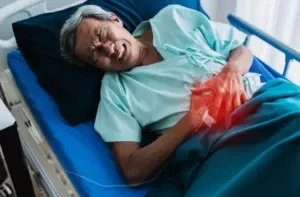
Pregnancy and Hormonal Factors
Can cause vein enlargement and temporary circulatory changes.

Vascular Surgery
Diet and Nutrition
Prevention
Diagnosis
Key Services
Key Facilities
Healthy arteries start with a healthy plate. Nutrition plays a crucial role in preventing and managing vascular disease.
- Eat plenty of fiber: Include fruits, vegetables, oats, and whole grains.
- Opt for good fats: Use olive oil, nuts, and fish rich in omega-3 fatty acids.
- Limit salt: Excess sodium raises blood pressure and harms arteries.
- Avoid sugar and refined carbs: These increase triglycerides and weight gain.
- Stay hydrated: Adequate water intake improves circulation.
- Control portion sizes: Overeating leads to obesity and poor vascular health.
- Include iron and B-vitamins: Support blood formation and oxygen delivery.
At VS Hospitals, dieticians collaborate with vascular specialists to design personalized meal plans for recovery and long-term arterial health. Patients undergoing vascular surgery receive specific post-operative nutrition guidelines to enhance healing and prevent recurrence.
Most vascular conditions can be prevented with simple lifestyle changes and routine screenings.
Effective Preventive Strategies:
- Quit smoking: Reduces risk of peripheral artery disease (PAD) and aneurysms.
- Exercise regularly: At least 30 minutes of walking or cycling daily improves blood flow.
- Maintain healthy weight: Reduces strain on veins and heart.
- Monitor blood pressure and sugar: Regular check-ups at VS Hospitals help detect abnormalities early.
- Manage stress: Meditation and deep breathing lower vascular tension.
- Wear compression stockings: Prevent varicose veins and leg swelling for at-risk patients.
- Stay hydrated and active during travel: Prevents blood clot formation in legs.
- Annual vascular screening: Especially for people with diabetes, hypertension, or family history of vascular disease.
VS Hospitals’ Preventive Vascular Program integrates lifestyle counseling, exercise training, diet planning, and periodic vascular imaging for high-risk individuals.
Accurate diagnosis is critical in vascular surgery since early detection greatly improves treatment success. At VS Hospitals, Chennai, patients benefit from advanced diagnostic imaging and specialized vascular tests performed by experienced professionals.
Diagnostic Procedures Include:
- Doppler Ultrasound & Duplex Scanning: Non-invasive imaging to assess blood flow, blockages, and vascular mapping.
- Ankle-Brachial Index (ABI) & Segmental Pressure Studies: Measure blood pressure differences to detect peripheral artery disease.
- CT & MR Angiography: Provide detailed 3D imaging of arteries and veins to identify narrowing or aneurysms.
- Venography & Arteriography: Contrast-based imaging to detect vein thrombosis, varicose veins, and arterial blockages.
- Blood Tests: Evaluate cholesterol, triglycerides, and clotting factors influencing vascular health.
The vascular team at VS Hospitals reviews these results to formulate an individualized treatment plan that ensures accuracy, safety, and long-term vascular health.
The Vascular Surgery Department at VS Hospitals offers comprehensive surgical and non-surgical treatments for all vascular conditions. From minimally invasive endovascular therapies to open surgical procedures, patients receive complete care from diagnosis through recovery.
Comprehensive Vascular Services Include:
- Peripheral Artery Disease (PAD) & Aneurysm Treatment: Angioplasty, stenting, bypass, and endovascular repair for blocked or weakened vessels.
- Varicose & Spider Vein Care: Laser therapy, radiofrequency ablation, and sclerotherapy for aesthetic and medical relief.
- Carotid & Dialysis Access Surgery: Plaque removal to prevent stroke and AV fistula creation for dialysis patients.
- Deep Vein Thrombosis & Lymphedema Management: Clot removal, compression therapy, and lymphatic drainage for swelling control.
- Endovascular & Vascular Trauma Surgery: Minimally invasive procedures and emergency repair for vascular injuries.
- Wound Care & Follow-up Programs: Specialized diabetic foot ulcer care and continuous vascular health monitoring.
The VS Hospitals vascular team uses a patient-focused approach, ensuring that every treatment is safe, effective, and tailored to the individual’s health condition.
VS Hospitals, Chennai, is recognized as one of Tamil Nadu’s leading centers for vascular surgery due to its modern infrastructure, skilled surgeons, and cutting-edge technology.
World-Class Facilities Include:
- Advanced Vascular Operating Theatres & Cath Labs: Hybrid imaging systems enabling precision-guided endovascular surgeries and stent procedures.
- Dedicated Ultrasound & Imaging Suites: Real-time Doppler and vascular imaging for accurate diagnosis.
- 24/7 Emergency & ICU Care: Immediate management of aneurysms, embolisms, and vascular trauma with continuous monitoring.
- Laser & Radiofrequency Units: Minimally invasive treatments for varicose veins and vascular malformations.
- Rehabilitation & Wound Care Support: Post-surgical physiotherapy, mobility programs, and diabetic ulcer management.
- Comprehensive Patient Care Services: In-house lab, counseling, and lifestyle education for long-term vascular health.
Every aspect of vascular care at VS Hospitals is designed to deliver precision, safety, and compassionate recovery under the supervision of expert vascular surgeons.
Top Medical Facilities at Our Multispeciality Hospital – Here’s What Makes Us Different!
Ready to Begin Your Vascular Health Journey? – Expert Vascular Care
Learn More About Vascular Surgery Procedures
Frequently Asked Questions
VS Hospitals offers advanced vascular care using minimally invasive and open surgical techniques. With expert surgeons, hybrid operating rooms, and 24/7 emergency support, patients receive high-precision treatment with faster recovery and reduced complications.
VS Hospitals treats peripheral artery disease, varicose veins, aneurysms, deep vein thrombosis, and diabetic vascular complications. The hospital provides personalized care using advanced imaging and minimally invasive therapies for best outcomes.
Yes. VS Hospitals offers state-of-the-art laser and radiofrequency ablation for varicose veins. These minimally invasive techniques ensure painless treatment, quick recovery, and excellent cosmetic results without traditional surgery.

